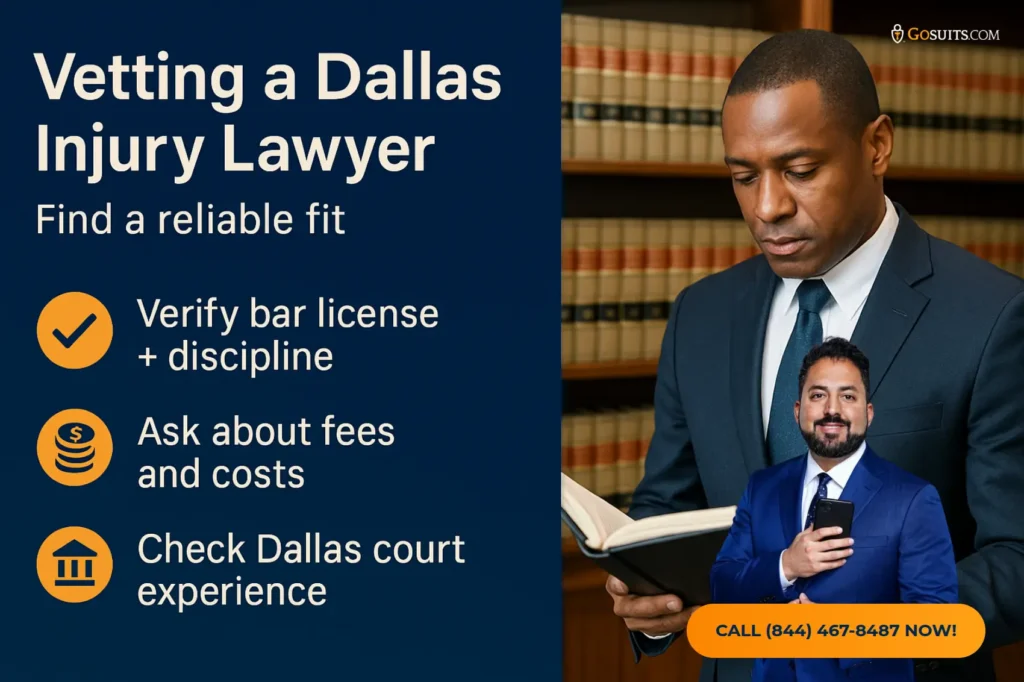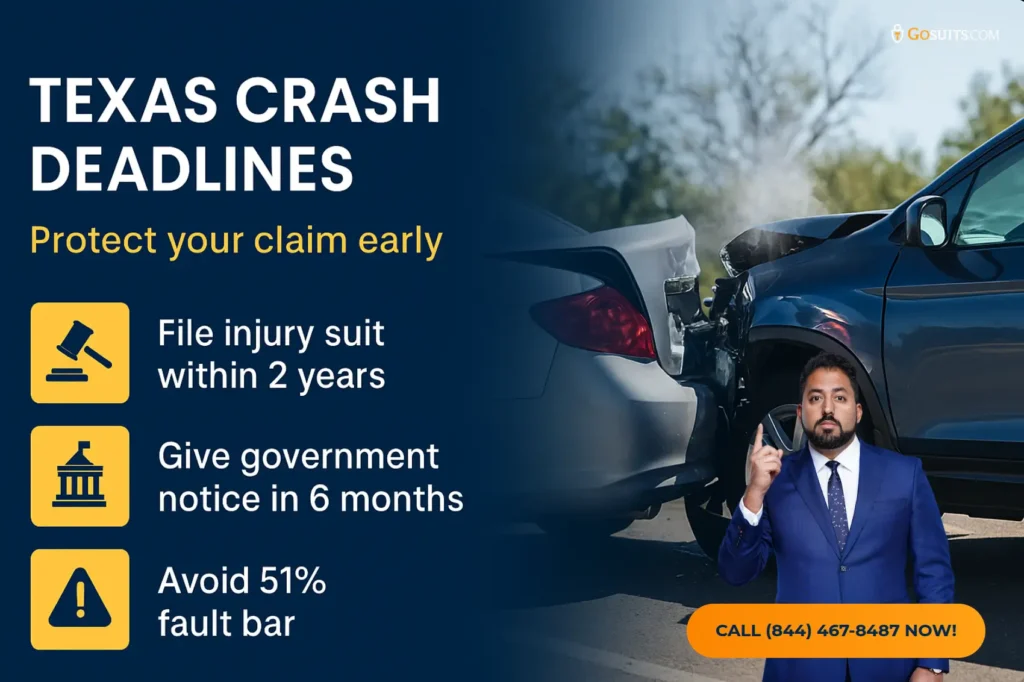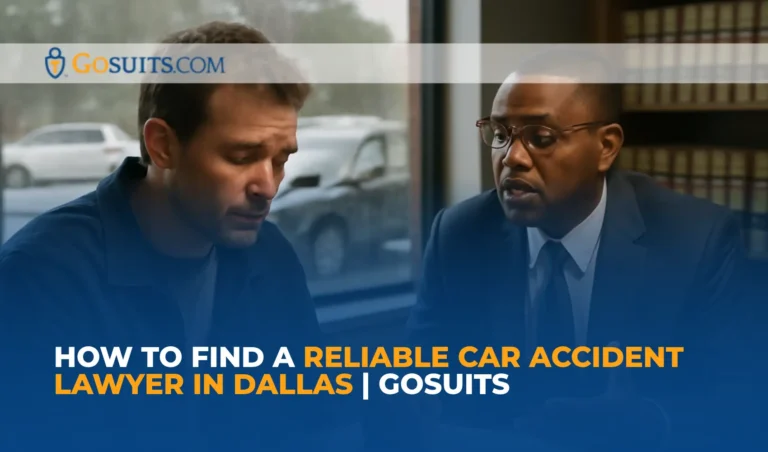- Why does hiring a Dallas car accident lawyer matter after a crash?
- What does a “reliable car accident lawyer in Dallas” really mean?
- How can you vet a Dallas car accident attorney before you hire?
- What do Dallas and Texas crash statistics tell us about risk and claims?
- What deadlines apply in Texas car accident and wrongful death cases?
- How do key rules compare among Texas, California, and Illinois?
- How do contingency fees work in Dallas and what fee terms should you ask about?
- How do insurance claim negotiations typically work in Texas injury cases?
- How do plaintiffs and defendants build or defend a Dallas auto accident case?
- What if your Dallas crash involved a government vehicle or employee?
- What if the other driver is uninsured or underinsured in Texas?
- Which documents and evidence help a Dallas lawyer evaluate your claim?
- Which courts and venues commonly handle Dallas car accident lawsuits?
- How can Spanish-speaking or bilingual support affect your case and comfort?
- What changes if the crash involved a commercial truck in Dallas-Fort Worth?
- What should you expect if your case goes to trial in Dallas County?
- What local, step-by-step plan can you use to find a reliable lawyer near you?
- Who is GoSuits and how does our technology-forward approach support injured Texans?
- How does GoSuits help with personal injury matters that impact Dallas families?
- Where can you find authoritative resources and laws mentioned here?
Why does hiring a Dallas car accident lawyer matter after a crash?
After a crash in Dallas, you are dealing with medical care, transportation, missed work, and calls from insurers. A reliable Dallas car accident lawyer can help you navigate liability, fault allocation, insurance coverage, and procedural deadlines. Texas applies proportionate responsibility rules that can reduce or bar recovery if your share of fault reaches a threshold, so early guidance matters for preserving evidence and protecting your claim. You do not have to carry this alone. Having an advocate coordinate investigation, preserve records, and communicate with insurers can reduce stress and position your case for a fair resolution.
What does a “reliable car accident lawyer in Dallas” really mean?
People often search for the best Dallas car accident lawyer, but reliability comes from concrete qualities rather than marketing claims. Consider whether the lawyer or firm:
- Has focused experience with Dallas and DFW courts so they understand local rules and jury pools.
- Communicates clearly and promptly in your preferred language and format.
- Explains strategy and risks in plain language without overpromising outcomes.
- Demonstrates knowledge of Texas laws like the statute of limitations, proportionate responsibility, and insurance claim practices with citations to authoritative sources.
- Prepares for trial when needed and has a record of litigating in Dallas County or neighboring counties.
- Offers transparent contingency fee terms consistent with Texas ethics rules.
- Respects your time with streamlined technology, secure document exchange, and efficient updates.

What do Dallas and Texas crash statistics tell us about risk and claims?
Understanding statewide and national crash trends helps set expectations for injury claims.
- Texas statewide fatalities reached 4,323 in 2023 and there were no deathless days on Texas roads, according to the Texas Department of Transportation’s Crash Facts report (TxDOT Crash Facts).
- Nationally there were an estimated 40,990 traffic fatalities in 2023, a slight decrease from 2022, per the National Highway Traffic Safety Administration’s early estimates (NHTSA).
Dallas-Fort Worth is a major metropolitan area with heavy traffic across Downtown Dallas, Uptown, Oak Lawn, Deep Ellum, Irving, Arlington, Plano, Richardson, Garland, Mesquite, Addison, Frisco, McKinney, and Carrollton. Congestion and multi-lane highways can complicate crash dynamics and make prompt investigation important.
What deadlines apply in Texas car accident and wrongful death cases?
Missing a deadline can end a claim, so it is important to ask counsel about timing right away.
- General statute of limitations: In Texas, most personal injury and wrongful death claims must be filed within two years of the injury or death. See Tex. Civ. Prac. & Rem. Code § 16.003.
- Claims against government entities: Written notice is often required within six months, and some local charters set shorter deadlines. See Tex. Civ. Prac. & Rem. Code § 101.101.
- Proportionate responsibility: Recovery may be reduced by your percentage of fault and barred at 51 percent or more. See Tex. Civ. Prac. & Rem. Code ch. 33.

Because certain injuries may not be obvious immediately, and evidence can be lost, early contact with a Dallas personal injury lawyer helps confirm the right deadline and preserve proof.
How do key rules compare among Texas, California, and Illinois?
If your crash involves drivers, vehicles, or policies from other states, cross-border rules may matter. Here are high-level comparisons, noting that facts drive which law applies.
- Texas: Two-year limitations period for personal injury and wrongful death in most cases (Tex. Civ. Prac. & Rem. Code § 16.003). Government notice often within six months (§ 101.101). Modified comparative fault with 51 percent bar (ch. 33).
- California: Two-year limitations for personal injury and wrongful death in most cases (Cal. Code Civ. Proc. § 335.1). Government claims generally require an administrative claim within six months before suit (Cal. Gov. Code § 911.2).
- Illinois: Two-year limitations for personal injury in most cases (735 ILCS 5/13-202). One year for actions against local public entities in many circumstances (745 ILCS 10/8-101).
Questions about governing law, venue, and jurisdiction are complex. A Dallas trial lawyer can assess which rules apply when an out-of-state defendant, insurer, or vehicle is involved.
How do contingency fees work in Dallas and what fee terms should you ask about?
Most Dallas auto accident attorneys use a contingency fee. You pay a percentage of the recovery if there is one, and you typically do not pay an attorney fee if there is no recovery. Texas ethics rules require reasonable fees and written terms.
- Ask about percentage ranges and whether they change if the case settles early, after suit is filed, or after a trial or appeal. See Texas Disciplinary Rules of Professional Conduct Rule 1.04 for guidance on fee reasonableness.
- Clarify case costs such as filing fees, records, experts, depositions, and whether they are advanced by the firm and reimbursed from settlement.
- Request a written fee agreement that explains how fees and costs are calculated and distributed.
- Confirm communication practices so you receive regular updates on offers, expenses, and next steps.
How do insurance claim negotiations typically work in Texas injury cases?
Negotiation strategy depends on liability, damages, and coverage. Texas law restricts unfair claim settlement practices by insurers, and understanding these rules can help you know what to expect.
- Third-party claims are typically made against the at-fault driver’s liability policy. Texas law prohibits certain unfair practices, such as failing to attempt in good faith to effectuate a prompt, fair, and equitable settlement when liability has become reasonably clear. See Texas Insurance Code § 541.060.
- First-party claims may involve your own UM/UIM, PIP, MedPay, or collision coverage, each with different terms. The Texas Department of Insurance offers consumer guidance on auto coverages (TDI Auto Insurance Guide).
- Evidence-driven offers rise when liability is well supported and injuries are documented. Timely medical records, diagnostic imaging, work impact documentation, and witness statements can move negotiations forward.
- Litigation leverage often changes bargaining positions. Filing suit starts formal discovery under the Texas Rules of Civil Procedure, which can produce more evidence and encourage resolution.
How do plaintiffs and defendants build or defend a Dallas auto accident case?
It helps to understand both sides of a civil case. This perspective can guide realistic expectations and strategic decisions.
- Plaintiff focus: Plaintiffs gather police crash reports, scene photos, dashcam footage, black box data where available, witness statements, medical records, and billing. They aim to prove duty, breach, causation, and damages while countering claims of comparative fault. Texas’s proportionate responsibility rules may reduce recovery by the plaintiff’s percentage of fault and bar recovery at 51 percent or more (Tex. Civ. Prac. & Rem. Code ch. 33).
- Defendant focus: Defendants and insurers examine speed, distraction, seat belt use, preexisting conditions, intervening causes, and mitigation of damages. They may seek independent medical evaluations and prior claims histories when permitted by the rules.
- Evidence rules: Relevance and reliability govern what the court will consider, and counsel should be prepared to address objections under the Texas Rules of Evidence.
What if your Dallas crash involved a government vehicle or employee?
Claims involving city, county, or state agencies follow special rules under the Texas Tort Claims Act. You must provide written notice to the governmental unit within six months of the incident, and some local charters may require shorter notice. See Tex. Civ. Prac. & Rem. Code § 101.101. Damage caps and other limitations may also apply under the Act.
Because these cases are deadline sensitive, consider contacting counsel quickly if your crash involved a police vehicle, city truck, or other governmental unit in Dallas, Dallas County, Collin County, or Tarrant County.

What if the other driver is uninsured or underinsured in Texas?
Texas insurers must offer uninsured and underinsured motorist coverage, and it can be declined only in writing. UM/UIM can cover injuries caused by drivers who have no insurance or insufficient limits. The Texas Department of Insurance provides a plain-language guide on auto coverages and how UM/UIM works (TDI Auto Insurance Guide).
If your crash occurred in Dallas-Fort Worth and the at-fault driver is uninsured, ask a Dallas auto accident attorney to review your policy declarations to evaluate UM/UIM, PIP, and MedPay options.
Which documents and evidence help a Dallas lawyer evaluate your claim?
You can make your consultation more productive by bringing what you have. If you cannot gather everything, your lawyer can help.
- Crash report or incident number from law enforcement.
- Photos or videos of the scene, vehicles, and visible injuries.
- Medical records and bills from emergency rooms, clinics, and specialists.
- Work records showing missed time or job duty changes.
- Insurance information for all vehicles and policies that may apply.
- Witness names and contact details if available.
- Vehicle data such as telematics or event data recorder information if accessible.
Texas discovery rules can help obtain additional evidence after filing suit, including depositions and document requests under the Texas Rules of Civil Procedure.
Which courts and venues commonly handle Dallas car accident lawsuits?
Most Dallas car accident lawsuits are filed in Texas state courts. The Texas court system provides an overview of trial courts, including district and county courts at law (txcourts.gov). Venue generally depends on where the crash occurred or where the defendant resides. A Dallas trial lawyer can advise on whether Dallas County, Collin County, Tarrant County, or another DFW venue is appropriate, and whether federal court might be considered in diversity cases.
How can Spanish-speaking or bilingual support affect your case and comfort?
Clear communication is essential. If you prefer Spanish, ask whether the law firm offers a Spanish-speaking car accident lawyer or bilingual staff. Comfort in discussing symptoms, work impacts, and family needs helps your attorney present the full picture to insurance adjusters and juries in Dallas County and surrounding areas.
What changes if the crash involved a commercial truck in Dallas-Fort Worth?
Commercial vehicle cases can involve federal and state safety rules, corporate defendants, and high-stakes insurance policies. Counsel familiar with trucking litigation may investigate:
- Hours-of-service compliance for fatigue issues under FMCSA regulations.
- Driver qualification files, training, and supervision.
- Electronic logging devices and telematics.
- Maintenance records and inspection histories.
Because these records can be time sensitive, early legal help can be important to preserve evidence under applicable regulations and discovery rules.
What should you expect if your case goes to trial in Dallas County?
While most cases resolve without a jury trial, trial readiness often improves outcomes. If trial becomes necessary, you can expect:
- Pretrial discovery with depositions, interrogatories, and document exchanges under the Texas Rules of Civil Procedure.
- Motions practice on evidence and legal issues under the Texas Rules of Evidence.
- Jury selection and presentation of witnesses and exhibits.
- Fault and damages questions consistent with Texas law on proportionate responsibility (ch. 33).
Ask your Dallas injury law firm how they prepare clients for each step and how they use visuals, technology, and clear storytelling to support your case.
What local, step-by-step plan can you use to find a reliable lawyer near you?
Here is a practical checklist for Dallas, TX and the wider DFW area.
- Identify your needs: Collision type, injuries, language preferences, comfort with remote communication, and urgency.
- Make a short list: Search for Dallas car accident lawyer, reliable car accident lawyer Dallas, Dallas auto accident attorney, and Dallas personal injury lawyer with strong community presence in Downtown Dallas, Uptown, Oak Lawn, Deep Ellum, Irving, Arlington, Plano, Garland, Mesquite, Addison, Frisco, McKinney, and Carrollton.
- Verify licensure: Use the State Bar of Texas attorney search to confirm active status and check public disciplinary history (texasbar.com).
- Review court readiness: Ask about experience in Dallas County and neighboring counties. Confirm familiarity with Texas Rules of Civil Procedure and Evidence (txcourts.gov rules).
- Discuss timeline and deadlines: Cover Texas’s two-year limitations period and any special notice for government-related claims (§ 16.003; § 101.101).
- Clarify fees: Request a written contingency agreement and ask how costs are handled, consistent with Texas ethics rules (Rule 1.04).
- Assess communication: Evaluate responsiveness and whether the firm offers Spanish-speaking support if needed.
- Prepare documents: Bring crash reports, medical records, insurance information, and photos for a productive free consultation.
- Choose on trust and fit: Go with the team that listens, explains strategy, and provides clear next steps without overpromising.
Who is GoSuits and how does our technology-forward approach support injured Texans?
GoSuits serves clients in Texas and focuses on resolving injury cases with speed and clarity. We don’t have case managers at our officr. We assign a dedicated attorney to every case, so you get the best representation possible. Also, we use proprietary software built in-house to streamline evidence collection, secure client communication, and case analytics that help us work faster and smarter. This platform is unique to GoSuits and supports better organization, quicker response times, and consistent follow-through from intake to resolution. Our team stays at the forefront of legal technology so clients can focus on recovery while we manage the details. We have achieved results across a range of injury cases, and our 30 years of combined experience include significant trial work that has benefited clients in and out of court. You can see examples of prior matters here: gosuits.com/prior-cases.
Our practice areas include car accidents, truck and commercial vehicle collisions, rideshare incidents, pedestrian injuries, premises liability, product-related injuries, and wrongful death. We are committed to clear communication, timely updates, and thorough preparation.

How does GoSuits help with personal injury matters that impact Dallas families?
If you or a loved one has been hurt in a crash involving a car, truck, Uber or Lyft, a pedestrian event, a Waymo or other AV incident, elder abuse-related transportation harm, or a wrongful death, you can reach out to GoSuits to talk through your situation. Here is a simple way to move forward:
- Action: Contact us to schedule a free consultation so we can evaluate liability, coverage, deadlines, and evidence.
- Value: Through the one-on-one relationship with your attorney, you will gain clarity about your legal options, what evidence matters most, and which steps can protect your claim.
- Urgency: Texas has strict deadlines and early evidence collection can make a difference. Acting now helps preserve your rights.
- Context: Whether the crash happened in Downtown Dallas, Uptown, Oak Lawn, Deep Ellum, Irving, Arlington, Plano, Richardson, Garland, Mesquite, Addison, Frisco, McKinney, or Carrollton, we can coordinate remotely or in person and keep you updated through secure technology.
Where can you find authoritative resources and laws mentioned here?
- Texas statute of limitations for personal injury and wrongful death: Tex. Civ. Prac. & Rem. Code § 16.003
- Texas proportionate responsibility: Tex. Civ. Prac. & Rem. Code ch. 33
- Texas Tort Claims Act notice requirement: Tex. Civ. Prac. & Rem. Code § 101.101
- Texas Insurance Code unfair settlement practices: Tex. Ins. Code § 541.060
- Texas court system overview: txcourts.gov
- Texas Rules of Civil Procedure and Evidence: txcourts.gov Rules and Standards
- State Bar of Texas attorney search: texasbar.com
- Texas Department of Insurance auto coverage guide: TDI Auto Insurance Guide
- TxDOT crash statistics and facts: TxDOT Crash Facts
- NHTSA national fatality estimates: NHTSA press release
- FMCSA hours-of-service rules: fmcsa.dot.gov
- California statute of limitations: Cal. Code Civ. Proc. § 335.1
- California Government Claims Act claim deadline: Cal. Gov. Code § 911.2
- Illinois statute of limitations for personal injury: 735 ILCS 5/13-202
- Illinois Local Governmental and Governmental Employees Tort Immunity Act deadline: 745 ILCS 10/8-101
- General legal definitions and terms: Cornell LII Wex and Law.com Dictionary






